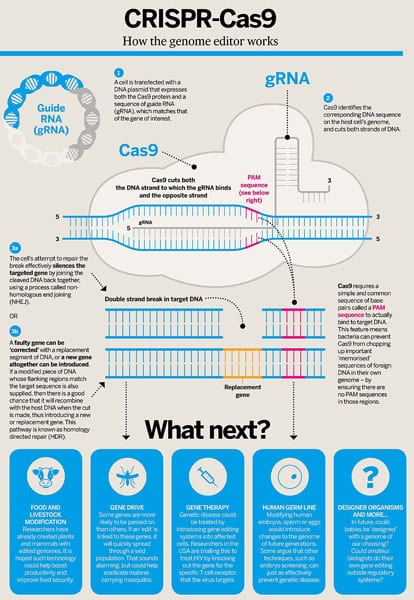
November 27, 2018; STAT News
This morning, in response to claims from Chinese scientists that CRISPR, the genetic editing tool, was used to alter a pair of twins’ DNA to make them more resistant to HIV, Kevin M. Esvelt penned an emergency call for an appropriate use of the nonprofit sector in protecting the public from what is essentially his invention—at least in part.
Esvelt is an assistant professor and leader of the Sculpting Evolution group at the MIT Media Lab. He’s listed as an inventor on various patents concerning CRISPR-based technologies filed by MIT and Harvard University, including localized and self-propagating gene drive systems.
Esvelt writes in STAT News, “Gene drive and other methods of editing the genomes of wild organisms could save millions of lives and prevent billions of animals from suffering each year. But advances that are intended to alter the shared environment must be developed and used wisely, if at all. For the foreseeable future, that means by nonprofits.”
After explaining the technology, he writes, “As one of those who introduced CRISPR-based gene drive to the world, I hold myself morally responsible for any and all consequences that emerge from the technology. In my eyes, if something goes wrong that I might have foreseen, that’s on me. If my actions or words inadvertently prevent gene drive from benefiting others, that’s on me. If my failure to act prevents it from saving lives, that’s on me.”
He continues:
So why do I oppose for-profit development and use of gene drive?
Sign up for our free newsletters
Subscribe to NPQ's newsletters to have our top stories delivered directly to your inbox.
By signing up, you agree to our privacy policy and terms of use, and to receive messages from NPQ and our partners.
I have nothing against capitalism that I don’t also hold against evolution. Capitalism is great for raising funds to launch risky ventures that wouldn’t otherwise be possible and, of course, at creating wealth more generally. If a for-profit company was to transparently disclose its intentions to edit the shared environment before starting research, commit to working closely with interested local communities, and generally ensure that people have a voice in decisions intended to affect them, I certainly wouldn’t have any ethical objections. But I do have a practical one.
When people know you will benefit financially from a proposal, they’re less likely to trust your judgment. According to one recent study focused on biotechnology, support drops by more than 20 percent when people learn that a technology was developed by a for-profit company rather than a nonprofit one.
NPQ has long promoted the notion that some realms of activity do not belong in the for-profit sector, and here is one more voice expressing why it is so critical that this sector understands its purpose in protecting the commons. While there are many apparent positive uses for this new technology, the capacity of corporations to weigh long-term effects for larger society against immediate extraction-based profits has never been more starkly in doubt.
But Esvelt reveals that his call for CRISPR to be placed under nonprofit stewardship comes more from his concern that it might otherwise be stopped by a moratorium proposed—and due to be voted upon—by the United Nations Convention on Biological Diversity. He writes, “Proponents claim that despite scientists’ focus on malaria and other humanitarian applications, the technology is primarily a tool to benefit giant agribusinesses. Mistrust is so strong that many people believe this argument, even though Monsanto’s license to use CRISPR explicitly forbids any use involving gene drive.” (Good luck on that.)
He ends with a renewed plea not to lock this technology away, but to place it under stewardship that would ensure its responsible use. “In an era of increasingly powerful and accessible technologies,” he writes, “we can’t afford to be thoughtless in how we develop and use our new capabilities—or decline to use them. That goes double for advances capable of unilaterally affecting the shared environment. For these kinds of controversial technologies, keeping early applications in the nonprofit realm could help us make wiser decisions about whether, when, and how to move forward.”
Now, the biggest problem with this argument is that it makes little sense for anyone to contend that nonprofit status brings with it a categorical purity of intention, especially at this particular moment and in regard to medical advancement—like, say, pharmaceuticals. Last year, we discussed the controversy among those who claim to hold the CRISPR patents and how much the public benefits from scientific advancements that come from discoveries at nonprofit universities. The notion is a good one, and we should as a sector aspire to fill the role Esvelt envisions, but for the time being, this may address the situation less well than the decision of that UN Committee would.—Ruth McCambridge













